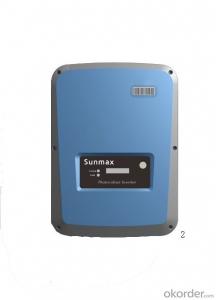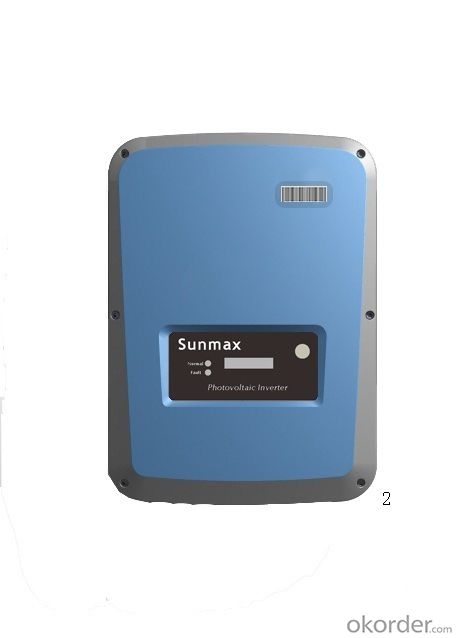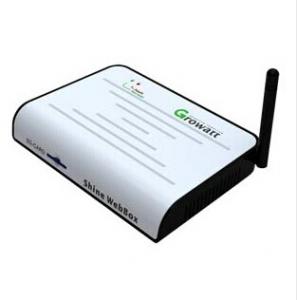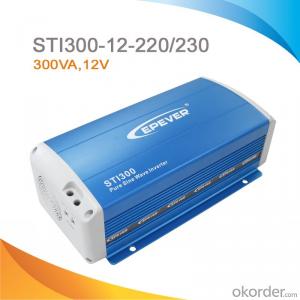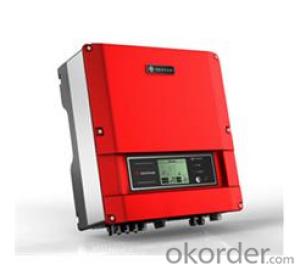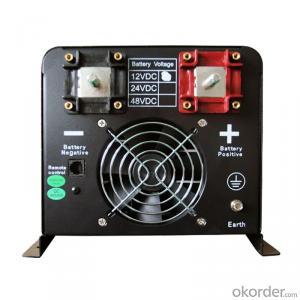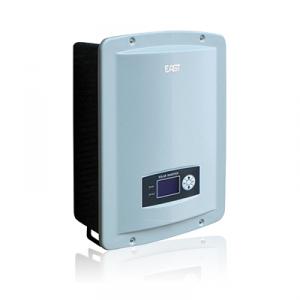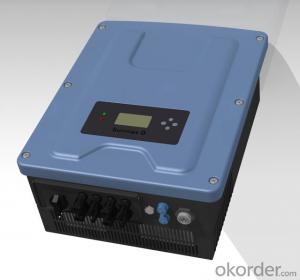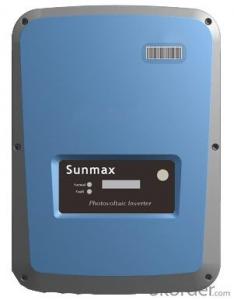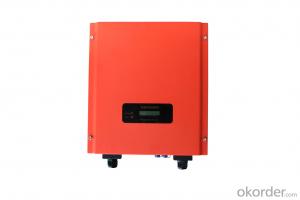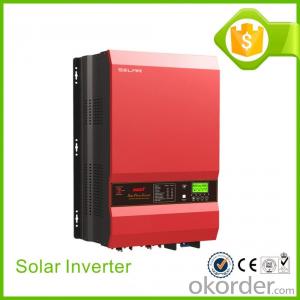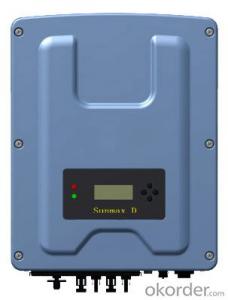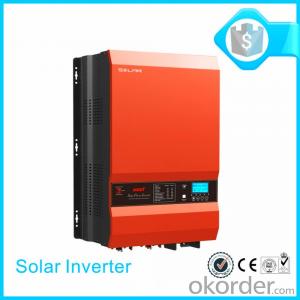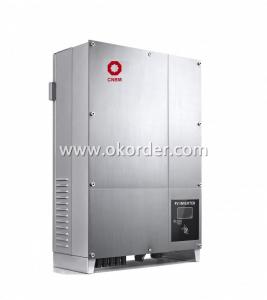Alpha Solar Inverter PV Sunmax 2000/3000/4000/5000
- Loading Port:
- Shanghai
- Payment Terms:
- TT OR LC
- Min Order Qty:
- 5 watt
- Supply Capability:
- 3000 watt/month
OKorder Service Pledge
OKorder Financial Service
You Might Also Like
Product Details
Sunmax 2000/3000/4000/5000 series are string type solar inverters for home grid connected solar generation systems. The Sunmax 1.5-5Kw series products are both reliable and good looking, have excellent technical characteristics and can be installed either indoors or outdoors.
High Efficiency:
The maximum efficiency of the inverter is up to 97.6%.
Single MPPT
Transfomer-less design
Wide range of MPPT voltage
Safe:
The units have built-in leakage current monitoring devices.
Units use thin-film capacitors ensuring better product performance.
IP65 protection class
Optional DC switch
Flexible:
indoor and outdoor installation option
Multilingual LCD display for the user to select
Hanging design makes installation easy.
RS485 integrated interface and the Bluetooth communication module makes the units convenient for monitoring
- Q: Can a solar inverter be used with a solar-powered water pumping system?
- Yes, a solar inverter can be used with a solar-powered water pumping system. A solar inverter is responsible for converting the direct current (DC) electricity generated by the solar panels into alternating current (AC) electricity, which is required to power the water pump. Therefore, a solar inverter is a crucial component in ensuring the efficient operation of a solar-powered water pumping system.
- Q: Can a solar inverter be used with a solar-powered air conditioning system?
- Yes, a solar inverter can be used with a solar-powered air conditioning system. The solar inverter converts the direct current (DC) electricity generated by the solar panels into alternating current (AC) electricity, which is used to power the air conditioning system. This allows the air conditioning system to run efficiently and effectively using solar energy.
- Q: Can a solar inverter be used with different types of solar tracking systems?
- Yes, a solar inverter can be used with different types of solar tracking systems. The solar inverter is responsible for converting the direct current (DC) generated by the solar panels into alternating current (AC) that can be used to power household appliances or be fed back into the grid. The type of solar tracking system, whether it is a single-axis or dual-axis tracker, does not affect the compatibility of the solar inverter. As long as the solar inverter is appropriately sized and compatible with the solar panels, it can be used with any type of solar tracking system.
- Q: How do you calculate the payback period for a solar inverter?
- To calculate the payback period for a solar inverter, you need to divide the initial cost of the inverter by the annual savings it generates. The payback period is the amount of time it takes for the cumulative savings to equal the initial cost.
- Q: What is the role of a solar inverter in a community solar project?
- The role of a solar inverter in a community solar project is to convert the direct current (DC) electricity produced by solar panels into alternating current (AC) electricity that can be used by homes and businesses in the community. It ensures that the solar energy generated is compatible with the existing electrical grid, allowing for seamless integration and distribution of clean energy to the community.
- Q: Can a solar inverter be used for three-phase power systems?
- Yes, a solar inverter can be used for three-phase power systems. Three-phase solar inverters are specifically designed to convert the DC power generated by solar panels into AC power for three-phase electrical systems. These inverters are capable of handling the higher voltage and power requirements of three-phase systems, making them suitable for commercial and industrial installations.
- Q: How does a hybrid solar inverter work?
- A hybrid solar inverter works by converting the direct current (DC) electricity generated by solar panels into alternating current (AC) electricity that can be used to power household appliances or fed back into the grid. It also has the capability to store excess solar energy in batteries for later use, ensuring continuous power supply even during periods of low sunlight or power outages. This enables users to maximize their solar energy utilization and reduce dependence on the grid.
- Q: How does a solar inverter communicate with monitoring systems?
- A solar inverter communicates with monitoring systems using various communication protocols such as Wi-Fi, Ethernet, cellular networks, or powerline communication. These protocols allow the inverter to transmit data such as energy production, system health, and performance metrics to the monitoring systems. This communication enables real-time monitoring, fault detection, and remote management of the solar system.
- Q: Can a solar inverter be used with a hybrid solar system?
- Yes, a solar inverter can be used with a hybrid solar system. A hybrid solar system combines solar power with other power sources, such as batteries or a backup generator. The solar inverter converts the direct current (DC) electricity generated by the solar panels into alternating current (AC) electricity, which can be used to power appliances and devices. Whether it is a grid-tied, off-grid, or hybrid solar system, a solar inverter is an essential component for converting and utilizing the solar energy effectively.
- Q: What safety features should a solar inverter have?
- A solar inverter should have several safety features, including overvoltage protection, overcurrent protection, ground fault protection, and arc fault protection. Additionally, it should have robust insulation to prevent electrical shock hazards and be equipped with sensors to monitor temperature and prevent overheating. Finally, it should have a secure enclosure to protect against environmental factors such as water, dust, and debris.
Send your message to us
Alpha Solar Inverter PV Sunmax 2000/3000/4000/5000
- Loading Port:
- Shanghai
- Payment Terms:
- TT OR LC
- Min Order Qty:
- 5 watt
- Supply Capability:
- 3000 watt/month
OKorder Service Pledge
OKorder Financial Service
Similar products
Hot products
Hot Searches
Related keywords
